|
|
|
Sort Order |
|
|
|
Items / Page
|
|
|
|
|
|
|
| Srl | Item |
| 1 |
ID:
115622
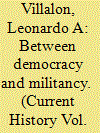

|
|
|
|
|
| Publication |
2012.
|
| Summary/Abstract |
The effort to try to distinguish between good and bad Muslim ideologies may be much less important than the need to support functional political institutions.
|
|
|
|
|
|
|
|
|
|
|
|
|
|
|
|
| 2 |
ID:
006253
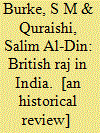

|
|
|
|
|
| Publication |
Oxford, Oxford University Press, 1995.
|
| Description |
xiv, 699p.hbk
|
| Standard Number |
0195775694
|
|
|
|
|
|
|
|
|
|
|
|
Copies: C:1/I:0,R:0,Q:0
Circulation
| Accession# | Call# | Current Location | Status | Policy | Location |
| 037502 | 954.03/BUR 037502 | Main | On Shelf | General | |
|
|
|
|
| 3 |
ID:
028774
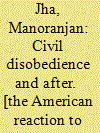

|
|
|
|
|
| Publication |
Meerut, Meenakshi Prakashan, 1973.
|
| Description |
xi, 300p.: bib.hbk
|
|
|
|
|
|
|
|
|
|
|
|
Copies: C:1/I:0,R:0,Q:0
Circulation
| Accession# | Call# | Current Location | Status | Policy | Location |
| 012185 | 954.03/JHA 012185 | Main | On Shelf | General | |
|
|
|
|
| 4 |
ID:
181883
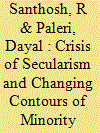

|
|
|
|
|
| Summary/Abstract |
This paper examines the changing nature of Muslim political mobilization in contemporary India in the context of Hindu nationalism’s ascendancy into power and the consequent crisis of traditional Muslim politics. Through an ethnographic case study of the Popular Front of India, we argue that a qualitatively new form of political mobilization is taking place among Indian Muslims centered on an articulation of “self-defense” against a “Hindu nationalist threat.” This politics of self-defense is constructed on the reconciliation of two contradictory processes: use of extensive legal pragmatism, and defensive ethnicization based on Islamic identity. The paper also examines the consequences of the emerging politics of competing ethnicization for even a normative and minimal idea of secularism and how it contributes to the process of decoupling of secularism and democracy in contemporary India.
|
|
|
|
|
|
|
|
|
|
|
|
|
|
|
|
| 5 |
ID:
040736
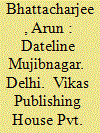

|
|
|
|
|
| Publication |
DelhI, Vikas Publishing House Pvt. Ltd, 1973.
|
| Description |
ix, 256p.hbk
|
| Standard Number |
706902432
|
|
|
|
|
|
|
|
|
|
|
|
Copies: C:1/I:0,R:0,Q:0
Circulation
| Accession# | Call# | Current Location | Status | Policy | Location |
| 011475 | 954.92/BHA 011475 | Main | On Shelf | General | |
|
|
|
|
| 6 |
ID:
048188
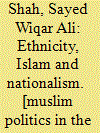

|
|
|
|
|
| Publication |
Oxford, Oxford University Press, 1999.
|
| Description |
liv, 311p.hbk
|
| Standard Number |
0195790502
|
|
|
|
|
|
|
|
|
|
|
|
Copies: C:1/I:0,R:0,Q:0
Circulation
| Accession# | Call# | Current Location | Status | Policy | Location |
| 042771 | 954.91/SHA 042771 | Main | On Shelf | General | |
|
|
|
|
| 7 |
ID:
108396
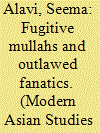

|
|
|
|
|
| Publication |
2011.
|
| Summary/Abstract |
This paper follows the careers of 'outlawed' Indian Muslim subjects who moved outside the geographical and political space of British India and located themselves at the intersection of nineteenth century trans-Asiatic politics: Hijaz, Istanbul and the Arab provinces of the Ottoman Empire, and Burma and Acheh in the East. These areas were sites where 'modern' Empires (British, Dutch, Ottoman and Russian) coalesced to lay out a trans-Asiatic imperial assemblage. The paper shows how Muslim 'outlaws' made careers and carved out their transnational networks by moving across the imperial assemblages of the nineteenth century. British colonial rule, being an important spoke in the imperial wheel, enabled much of this transnationalism to weld together. Webs of connections derived from older forms of Islamic connectivity as well: diplomacy, kinship ties, the writing of commentaries on Islam and its sacred texts in unique ways, oral traditions, madrasa and student contacts. These networks were inclusive and impacted by the tanzimat-inspired scriptural reformist thought in the Arab provinces of the Ottoman Empire. They were not narrowly anti-colonial in tone as they derived from a complex inter-play of imperial rivalries in the region. Rather, they were geared towards the triumph of reformist Islam that would unite the umma (community) and engage with the European world order. The paper shows how this imperially-embedded and individual-driven Muslim transnational network linked with Muslim politics rooted within India.
|
|
|
|
|
|
|
|
|
|
|
|
|
|
|
|
| 8 |
ID:
120868
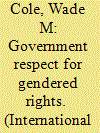

|
|
|
|
|
| Publication |
2013.
|
| Summary/Abstract |
Using two-stage least-squares regression models, I analyze the effect of the Convention on the Elimination of All Forms of Discrimination against Women (CEDAW) on rated levels of respect for women's rights. The results show that CEDAW has a strong positive effect on women's political rights, no effect on economic rights, and a partially negative effect on social rights. Detailed analyses of political outcomes reveal that CEDAW membership was associated with an increase in the share of women in national parliaments but had no effect on the likelihood that governments adopted legislative quotas guaranteeing female representation in parliament. CEDAW was also more effective for some kinds of countries than others. Post-ratification improvements were particularly strong in democratic countries and countries with extensive linkages to women-focused international organizations, but CEDAW proved ineffective in Muslim polities and societies. The paper evaluates the implications of these findings and proposes new avenues for research.
|
|
|
|
|
|
|
|
|
|
|
|
|
|
|
|
| 9 |
ID:
127595
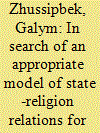

|
|
|
|
|
| Publication |
2013.
|
| Summary/Abstract |
Secularism may take different shapes and forms in different contexts, from aggressively hostile toward religion to accepting and standing for the public visibility of religion. The latter model, which is depicted as passive secularism, can be qualified as a human rights-oriented and democracy-friendly model. Secularism in Turkey is undergoing fundamental transformation from assertive to passive, and the process is still going on. The continuing evolution of the "Turkish secularism" model cannot be understood properly without taking into account the peculiarities of the "internally-driven" and gradual evolutionary transformation of the Turkish elites, social forces, and society, including the "Özal and AKP factors," which have been crucial in liberalizing political, economic, and sociocultural life in Turkey. In this respect, recent Turkish experience constitutes a striking example for post-Soviet Central Asia. On the whole, passive secularism would be a better choice for the Central Asian countries in building a tolerant, stable, and viable society.
|
|
|
|
|
|
|
|
|
|
|
|
|
|
|
|
| 10 |
ID:
026926
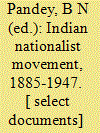

|
|
|
|
|
| Edition |
1st ed.
|
| Publication |
London, Macmillan Press Ltd., 1979.
|
| Description |
xxiii, 272p.hbk
|
| Standard Number |
333902823
|
|
|
|
|
|
|
|
|
|
|
|
Copies: C:1/I:0,R:0,Q:0
Circulation
| Accession# | Call# | Current Location | Status | Policy | Location |
| 027522 | 954.035/PAN 027522 | Main | On Shelf | General | |
|
|
|
|
| 11 |
ID:
165251
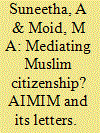

|
|
|
|
|
| Summary/Abstract |
Many scholars of the Indian State now argue that, given its limited resources and capacities to recognize and service its citizen-subjects, it relies on numerous mediators, including political parties, to administer, govern and rule its populace. The discourse of Indian citizenship meanwhile has moved towards the principle of ethnicity, making Muslim citizenship – as a legal status, a bundle of rights and entitlements, or a sense of identity and belonging (Jayal, 2013, Citizenship and Its Discontents: An Indian History. Ranikhet: Permanent Black, 2) – an increasingly fraught terrain. Located in this theoretical context, our paper examines the political mediation process put in place by the Hyderabad based Muslim political party, the All India Majlis-e-Ittehadul Muslimeen (AIMIM). Drawing on fieldwork at its office, known as Darussalam, during 2010–2011, we argue that this organized mediation is a response to the marginalization of Muslims in the region, which has also evolved to respond to the needs of another marginalized population, Dalits. As such it should be read as a likely form that political representation of the marginalized and Muslims could take in post-colonial India.
|
|
|
|
|
|
|
|
|
|
|
|
|
|
|
|
| 12 |
ID:
137754
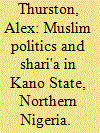

|
|
|
|
|
| Summary/Abstract |
Since 1999, Muslim-majority northern Nigeria has witnessed a new phase of political struggles over the place of Islamic law (shari'a) in public life. This article traces how Muslim politics played into shari'a administration in Kano, northern Nigeria's most populous state, and argues that governmental bureaucracies created for the purpose of administering shari'a became sites of political contests over the meaning of public morality in Islamic terms. Shari'a bureaucracies featured as prizes in unstable political alliances between Muslim scholars and elected Muslim politicians. Politicians' appointments of Muslim scholars to bureaucratic positions, and their empowerment or disempowerment of certain bureaucracies, posed fundamental questions concerning who would control the shari'a project and what its content would be. The manoeuvres surrounding Kano's shari'a bureaucracies reflect broader trends in northern Nigerian politics. The shari'a project has not been a manifestation of Islamism in a narrow sense, but rather the site of a more complex set of intra-Muslim rivalries and electoral competition within an ostensibly secular political system.
|
|
|
|
|
|
|
|
|
|
|
|
|
|
|
|
| 13 |
ID:
055336
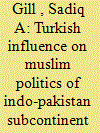

|
|
|
| 14 |
ID:
142944
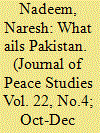

|
|
|
|
|
|
|
|